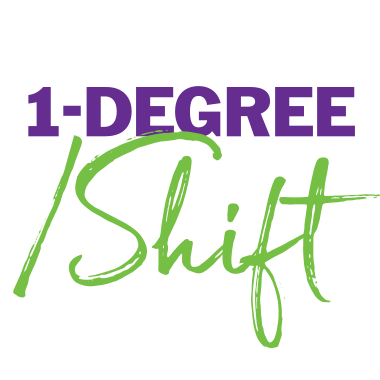At 1-DEGREE/Shift, we specialize in supporting organizations’ shifts from a current state culture to a desired state culture, and when we take a step back and reflect on the work we’ve done this past year since COVID-19 emerged in North America, there is a clear ask/theme that bubbles to the surface.
In celebration of International Women’s Day, hosted in March every year, it is our delight to share with you that the main ask we’ve seen amongst many organizations is:
A Call/Desire For Increased Feminine Energy In Organizational Cultures
What is feminine energy and how does it show up in the workplace?
Feminine and masculine energies are universal: they transcend sex and gender. All people possess both feminine and masculine energies and have the potential to express one energy more than the other. The business realm has long been dominated by more masculine energy (e.g. traditionally characterized by prioritizing goals or outcomes over people, emphasis on hierarchy, focus on achievement). However, it appears what organizations want more of in their cultures is changing – from more masculine energy to more feminine energy.
A research study conducted by Barrett Values Centre showed that although male and female leaders shared most of their top values, the values that did differ were distinct. Barrett points out values that appeared only on the male leaders’ list, and the values that appeared only on the female leaders’ lists were in line with what is commonly characterized as masculine or feminine.
The values that appeared only among male leaders were: goals orientation, experience and achievement. Values appearing only on the female list were: open communication, teamwork, cooperation and long hours. “Male leaders are seen to show a tendency to be focused on successfully reaching their objectives, with goals orientation and achievement. Female leaders are seen as promoting strong working relationships with others through open communication, teamwork, and cooperation.” (https://www.valuescentre.com/wp-content/uploads/PDF_Resources/Front_facing_articles/Article_Understanding_the_Battle_of_the_Sexes.pdf).
This underlines that feminine and masculine energy can be expressed in many ways, including the values we choose to live through and hold important. Feminine energy is associated with community and connection, and being empathetic, intuitive and creative. Masculine energy is associated with taking action, being productive and efficient, and accomplishing.
Why is this relevant? As it has now been more than a year since the beginning of the COVID-19 pandemic, we are beginning to recognize the impacts it’s had on all aspects of our lives. One affected area is the workplace. Some of us have had to make “workplace” synonymous with “home” as people adapted to working remotely. More deeply however, the workplace has undergone change far greater than on an operations level. We are coming to learn that COVID-19 may have provided a catalyst for an incredible shift in workplace culture – one that shifts us more towards feminine energy in the workplace.
What Evidence Proves the Ask for More Feminine Energy in the Workplace?
A) Global COVID-19 Culture Assessment Conducted by Barrett Values Centre
Barrett Values Centre, a global leader in assessing workplace cultures, ran a culture assessment worldwide shortly after the start of the pandemic. With 1400 participant responses, clear themes emerged in respondents’ expectations or asks of their desired work cultures. Results showed that work cultures were making a transition from a focus on values that have more masculine energy (performance, control, hierarchy) to values that have more of the feminine (adaptability, teamwork, caring/compassion). Interestingly, with this shift toward the feminine, we are also seeing an overall decline in Cultural Entropy (degree of dysfunction) within organizations. (https://www.valuescentre.com/covid/) (https://www.valuescentre.com/resource-library/covid)
B) 1-DEGREE/Shift’s client work this past year
100% of the clients with whom we have run Cultural Values assessments through this first year of COVID have all asked for desired culture values that primarily focus on people and caring for people (traditional feminine energy). What do those asks look like?
- Almost all clients asked for balance (home/work) or added well-being to their culture codes
- Caring, teamwork, embracing diversity, employee fulfillment, open communication
- A theme around growth: either professional growth, leadership development, coaching/mentoring etc.
C) What does this mean for workplaces looking to infuse more feminine energy in their work cultures?
Here are a few simple, tactical ways you can address some of the most common asks in desired culture. In response to asks for:
Well-being and Balance (work/home):
- Some clients have designated ‘no meeting’ days or hours where employees are invited to refresh/recharge or take care of things in their home lives
- Designate walking meetings to get people out and active
- Clear expectations about the length of virtual meetings and the need for breaks to be included
- Virtual meetings that create space for connection – relationship time – 100% transactional feels like it respects time but people feel disconnected with each other
Open Communication: Provide opportunities for more:
- two-way communication between staff and leaders – formal and informal
- share with all staff the health of the business more frequently and shifts made to plans/processes/direction
- create systems, channels, repositories where anyone can easily access key information about the organization
- feedback systems (i.e. regular employee engagement surveys) providing you with the data you need to better understand your people
- review communication platforms – what is best on email? What is best on Slack/Teams? What is best communicated in a meeting?
Teamwork: be conscious of the inherent risk for teams to become siloed in our virtual environments, and consider promoting more cross-functional teamwork by:
- encouraging staff to look beyond their immediate team members for input/feedback on decisions or when working on key initiatives
- working together to collectively overcome challenges unique to our COVID environment that may be affecting the business
Placeholder for Feminine Energy in our Personal Lives
It is evident that feminine energy is becoming more prominent in our workplaces, but how can we incorporate more of it in our personal lives? Here are four ways that we can begin to tap into our feminine energy:
- Connect with nature: Make it a practice to connect with nature, be it a walk through a garden, sitting by flowers, standing barefoot on the grass, or reading by a tree.
- Use your intuition: When making decisions, connect first to the feminine energy of being; use your intuition and inspiration to tap into the wisdom within.
- Build community: Join or become part of a community where there is mutual support of one another (this can be an online or virtual community, support group, mastermind, on the phone, or in person).
- Practice appreciation and gratitude: Pay attention to your bounty, to all that you can appreciate from something as small as the food on your table, your heart that is beating on your behalf, or the car that drove you to work. What you appreciate, appreciates. Gratitude begets more opportunities for deeper gratitude. Watch your life be filled with more ease, calm, peace, and sweetness. (https://chopra.com/articles/embracing-feminine-energy-in-an-overtly-masculine-world)
The ask is clear: the need for more feminine energy in the workplace during this pandemic is resonating on a global level. We challenge you to infuse more feminine energy in your personal life and reflect on the ways in which you have personally contributed to fulfilling this need for feminine energy in your organization. What can you practice in your personal life that can also extend to your workplace?
Feminine energy will look different in different work environments and cultures, and if you are curious to learn more about what it could look like in yours, we welcome your inquiry and we are ready to have a conversation with you.
1-DEGREE/Shift team, March 30th, 2021
Let’s Connect

